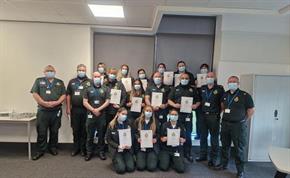
A new initiative brought in at the end of 2022 has seen the Trust recruit and induct a new staff group to help bolster the workforce.
Pre-Hospital Practitioners (PHPs) are experienced, registered clinicians from a variety of nursing and Allied Health Professions (AHPs), who have decided to join EEAST as a change of career.
This group go through an induction and training programme to help them make the move from in/hospital to ‘pre-hospital’ practice – initially working on a double-staffed ambulance.
The first group of 14 have nursing backgrounds. They were warmly welcomed to the Trust in their initial placements over Christmas and are due to start their next placements today [Monday 23rd January].
Steve Barren, Education Manager, focusing on Innovation and Design, said:
“This initiative is proving popular and there is a great deal of interest from our nursing and AHP colleagues across the region. It allows us to draw on the knowledge and experience of a really diverse group so we can best help our patients across the region.
“We would like to pass on our thanks to all who helped with the induction programme and provided them such a valuable experience during placement - their feedback was very positive.
“Courses are being planned throughout this year and our ambition is to continue to help build resilient teams.”
What does the induction programme actually look like?
It is a modular programme consisting of five separate but related modules (up to 40 weeks in total):
Are PHPs the same as NQPs?
There are similarities, but they are not the same. PHPs are not paramedics, but they will have professional registration with either the Nursing and Midwifery Council (NMC) or Health and Care Professionals Council (HCPC). They will have completed relevant competency programmes in their specialist area, so the PHP programme is designed to support the PHPs transition into an unfamiliar working environment, allowing them to use their extensive knowledge, experience and skills. Their support reflects a preceptorship model, but they are not required to complete the NQP consolidation period framework.
Do PHPs have their own scope of practice?
EEAST’s service delivery model does not currently support a specific scope of practice for NMC and other HCPC registrants. Therefore, the plan is for PHPs to work to a paramedic scope of practice, with some caveats for medicines management and administration, under patient group directives. The specialist skills that PHPs bring to EEAST will help inform initiatives around deployment and advanced practice, and specific scopes will be developed in time.
Who can PHPs work with?
During module 2 and 4 supernumerary ‘placement’ PHPs must be supervised by an appropriate band 6 registrant (paramedic or Ambulance Nurse). For their 8-week post induction consolidation they should be supported 1:1 by a registrant, on a DSA, although resourcing challenges may result in band 5 EMTs offering their support. In this period, PHPs must not be resourced onto a vehicle with a band 3 support colleague or anyone on a current education programme (PDA, AEMT etc).
NQPs – NQPs should be supported to complete their own consolidation and should not be used to support PHP development in their first 12 months of NQP consolidation. Where resourcing is a challenge, NQPs approaching the end of their two-year consolidation, or awaiting confirmation of fast track could be used to support PHPs during their 8-week consolidation.
Do PHPs have a Practice Assessment Document (PAD)?
As experienced registrants in their own right, PHPs are not completing a generic PAD. However, there is a need for PHPs to identify skills gaps and are therefore completing a document referred to as a competency framework or learner log. This is completed by the individual, but those supervising PHPs in practice, along with other colleagues, might be asked to confirm that they have observed a skill or to undertake a professional conversation.
What support are PHPs getting after their 10-week induction and 8-week consolidation?
PHPs will have regular meetings with Clinical Leads and a member of the education team, until their competencies are complete. These ‘supervision’ meetings are designed to guide and develop PHPs throughout the remainder of their learner journey.
What do I do if I have questions or queries about the PHP programme
You can approach your T&E LOM, Clinical Lead or a member of the education or clinical practice team. Alternatively, you can email training.managers@eastamb.nhs.uk
Monday 23rd January 2023